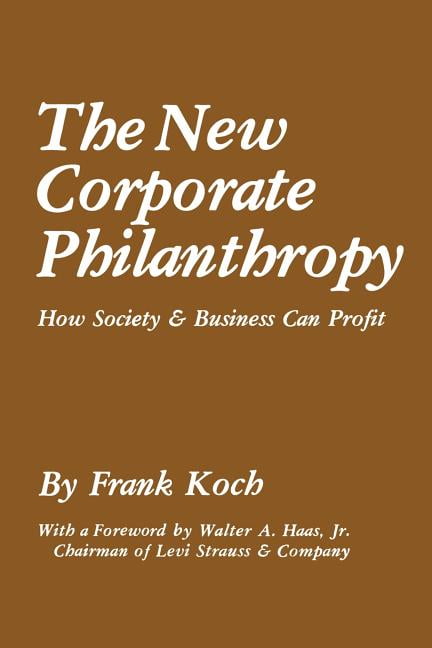Corporate philanthropy in finance: Where innovators are making a difference
The Role of Business Philanthropy in Fostering Sustainable Organization Practices
Corporate philanthropy has arised as a critical method for organizations intending to incorporate sustainability into their procedures. By straightening company objectives with environmental and social initiatives, organizations can promote much healthier ecosystems. This method not just enhances corporate credibility however likewise reinforces stakeholder relationships. The real level of its influence on long-term company success remains to be explored. What innovative practices are being taken on because of this?
Understanding Corporate Philanthropy and Its Importance
Business philanthropy works as an important mechanism whereby businesses can add to societal health while boosting their very own credibilities. This practice involves organizations allocating sources, such as funds, time, or expertise, to sustain neighborhood campaigns, charitable causes, or social programs. By involving in humanitarian efforts, companies can address pushing social problems, such as education, healthcare, and ecological worries, therefore playing a crucial duty in fostering favorable modification.
Business philanthropy can improve worker spirits and attract ability, as people increasingly look for to function for socially accountable organizations. It can additionally enhance consumer loyalty, as customers prefer brand names that demonstrate a dedication to making a difference. Eventually, understanding the value of business philanthropy hinges on acknowledging its twin benefits: improving neighborhood well-being while concurrently enhancing service integrity and credibility in the eyes of stakeholders. This placement of social duty with commercial rate of interests emphasizes its importance in today's business landscape.
The Link Between Company Philanthropy and Sustainability
While several companies take part in philanthropy to improve their public picture, a deeper connection exists between business philanthropy and sustainability. Company philanthropy often aligns with sustainable methods by sustaining campaigns that resolve social and environmental difficulties. They add to a healthier community and society when services spend in neighborhood jobs, eco-friendly power, or instructional programs. This dedication not just fosters goodwill but also strengthens stakeholder connections, improving brand name commitment.

Instance Studies: Successful Business Philanthropy Initiatives
Various companies have actually effectively integrated kind campaigns into their company approaches, showing the tangible benefits of such dedications. For instance, Microsoft has actually introduced numerous programs, such as its AI for Earth campaign, which supports ecological sustainability with technology. This approach not only help conservation initiatives yet additionally boosts Microsoft's track record as a leader in corporate obligation.
Similarly, Unilever's Sustainable Living Plan stresses social and environmental impact, straightening its philanthropy with company objectives. By moneying projects that enhance hygiene and cleanliness, Unilever enhances its brand while contributing to international health.
One more notable example is Patagonia, which promises 1% of sales to ecological reasons. This commitment resonates with customers, cultivating loyalty and driving sales.
These situation researches highlight that reliable corporate philanthropy can produce economic returns while promoting sustainable methods, strengthening the concept that ethical company methods are valuable for both culture and base lines.
Building Stronger Stakeholder Relationships Through Philanthropy
Philanthropy functions as an essential tool for companies seeking to strengthen their relationships with stakeholders, as it promotes depend on and shows a dedication to social responsibility. By engaging in charitable efforts, services can attach with neighborhood neighborhoods, improving their track record and encouraging stakeholder loyalty. This engagement typically brings about purposeful communications, developing a feeling of shared values between the business and its stakeholders.
Furthermore, humanitarian efforts can address specific community needs, permitting companies to add positively to societal challenges. This participation not just showcases a firm's honest stance yet also aids in drawing in and keeping customers that focus on social duty.
In addition, workers typically feel extra inspired and involved when they see their this website company proactively joining philanthropic tasks, causing a much more effective work environment culture. Subsequently, business philanthropy ends up being a critical opportunity for building more powerful, more durable relationships with diverse stakeholder groups.
Measuring the Influence of Corporate Philanthropy on Service Success
The link between business philanthropy and stakeholder involvement sets the stage for examining its influence on total company success. Organizations commonly gauge this impact through different metrics, consisting of brand track record, staff member satisfaction, and client loyalty. Philanthropic efforts can enhance a business's picture, promoting depend on amongst financiers and consumers alike. Additionally, involved workers often tend to exhibit higher morale and productivity, directly correlating to improved business efficiency.
Quantitative evaluation can likewise be utilized, with organizations evaluating financial returns versus kind expenditures. Research shows that firms with solid humanitarian commitments typically experience greater stock performance and lowered volatility. In addition, qualitative evaluations, such as stakeholder feedback, can supply understandings right into area understandings and long-term relational benefits.
Eventually, gauging the impact of business philanthropy calls for a multifaceted approach, integrating both qualitative and quantitative data to assure an extensive understanding of its influence on business success. corporate philanthropy.
Regularly Asked Questions
Just How Can Local Business Take Part In Corporate Philanthropy Properly?

What Prevail False Impressions Concerning Business Philanthropy?

Just How Does Business Philanthropy Influence Staff Member Morale?
Business philanthropy favorably influences employee spirits by promoting a sense of objective, improving task fulfillment, and promoting commitment. Workers often really feel much more involved and encouraged when their business contributes to social causes, developing a helpful workplace.
What Are the Tax Benefits of Company Philanthropy for Organizations?
Corporate philanthropy offers substantial tax advantages for businesses, consisting of deductions on philanthropic contributions and potential decreases in taxable earnings. These incentives motivate firms to engage in social efforts while at the same time enhancing their monetary standing.
Just How Can Companies Select Reliable Philanthropic Partners?
Business can choose efficient kind partners by examining placement with their values, evaluating influence capacity, checking out financial transparency, and promoting solid interaction. This strategic technique boosts collaboration and assurances shared advantages for both events entailed.
Corporate philanthropy serves as an essential mechanism through which services can contribute to social wellness while boosting their very own credibilities - corporate philanthropy. Eventually, recognizing the relevance of company philanthropy exists in identifying its dual benefits: enriching community welfare while at the same time improving company integrity and reliability in the eyes of stakeholders. While many companies engage in philanthropy to enhance their public photo, a much deeper link exists in between business philanthropy and sustainability. The link between business philanthropy and stakeholder interaction sets the stage for reviewing its influence on total organization success. Company philanthropy uses considerable tax benefits browse around these guys for businesses, consisting of reductions on philanthropic contributions and potential decreases in taxable income